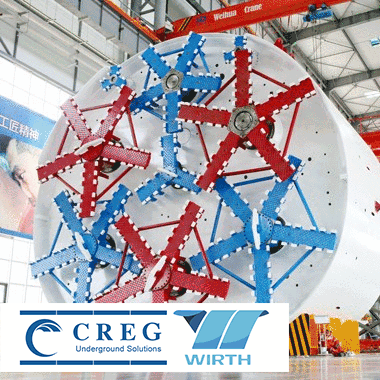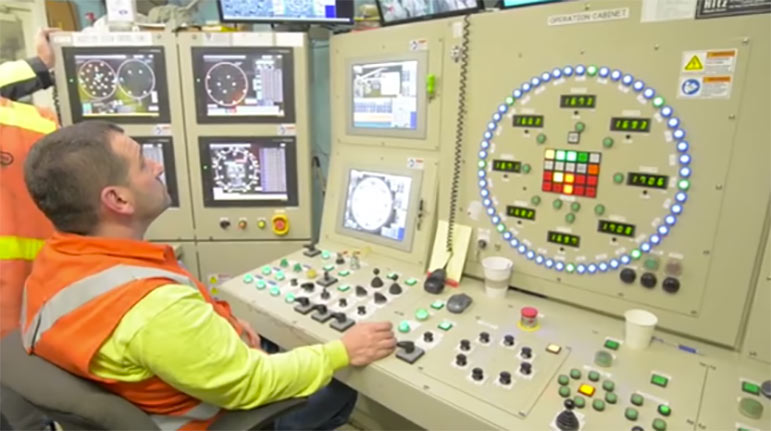STP management changes enable Bertha restart 23 Feb 2016
After 41 days of zero progress, Bertha resumes tunneling in Seattle following project owner WSDOT’s decision to lift the ‘suspension for cause’ order on Tuesday (February 23).
Bertha reaches Safe Haven 3 milestone 15 Mar 2016
TBM Bertha has successfully reached Safe Haven 3 following three weeks and 300ft (91m) of mining since being allowed to restart under conditions of tight supervision.
According to Seattle Tunnel Partners (STP), the contractor joint venture of Dragados and Tutor Perini, the TBM functioned within required operating parameters. The machine has now advanced a total of 1,560ft (475m) of its 2,700m-long drive.
STP will now spend up to one month inspecting the machine and performing planned maintenance, including: hyperbaric interventions, inspection of the cutterhead and main drive unit, replacing the cutting tools, and extending the conveyor belt and high voltage cable.
Once maintenance is completed, Bertha will advance under the Alaskan Way Viaduct, which WSDOT plans to close for approximately two weeks.
Safe Haven 3, located 60ft underground and 450ft from the north wall of the recovery shaft and 40ft west of the viaduct, is a concrete structure built in 2013 to enable a more stable maintenance environment within the excavation chamber behind the cutterhead.
The decision follows an independent expert review of the root cause of a 35ft x 15ft sinkhole that appeared behind the TBM drive path on January 12, and a series of follow-up discussions and meetings between contractor and owner over the last six weeks.
As a result of those discussions, Dragados, as lead partner in the Dragados/Tutor Perini contractor JV (Seattle Tunnel Partners), has installed a new tier of project management and drafted in four key new personnel. During a media conference call attended by TunnelTalk on Tuesday (February 23), Washington State Governor Jay Inslee said: “We have got a significantly improved team. I think of this as changing the quarterback out, or at least the tight end, and I think that is important.”
WSDOT program manager Todd Trepanier explained: “A part of this personnel change is in response to [our requirement] that STP demonstrate their whole team can function differently during this period of the conditional lift [of the ‘suspension for cause’ order].”
Chris Dixon remains as STP Project Manager, but will now be supported by a permanently appointed Tunnel Manager. Additionally, three temporary appointments are made for the duration of the demonstration period that will be imposed for the next 25 rings (160ft) of TBM advance. This period will then be reviewed again, prior to a final, and also supervised, 100ft drive into Safe Haven 3.
The three temporary appointments include the head of the tunnelling technical directorate of Dragados, plus two further specialists: one in tunnelling and soil conditioning, the other in TBM operations.
WSDOT says these specialist positions are aimed at ensuring there is no repeat of the “over-excavation” of the face that it says caused the sinkhole to appear in the first place. It is also aimed at ensuring there is sufficient expertise in place to take immediate and appropriate mitigation/soil conditioning measures should over-excavation occur again.
Trepanier said: “We came to the conclusion that the sinkhole did have something to do with the management oversight and the decision-making that was taking place.
“STP did talk at the time about some ground calculation reconciliation not taking place during some of the ring-build in question. This is a key piece of tunnelling work that is important for making sure there is not a problem with voids, and something that is [now] being taken care of as far as we are concerned, thereby enabling us to authorize this conditional lift [of the suspension].
“This is being done in two ways: the additional management oversight, and changes in the quality oversight. This [latter] is an independent quality team that is typical to have on design-build contracts whereby the contractor has a separate wing that watches their work.
“This is being changed in terms of an increase in the number of individuals watching STP, and having them play a larger role in double-checking that all the activities that need to take place are actually taking place; and they are bringing matters to attention both verbally and in writing.”
Trepanier also said that WSDOT had sought assurances from STP during the latest lay-off period that all its TBM operators were sufficiently well trained. STP responded by sending to the owner a register of the individual qualification history of every operator on its team. However, Trepanier said that some of the training listed in the training registers supplied had taken place after the imposition of the suspension order. “This was essentially training them how to do their jobs within the tunnelling operation,” explained Trepanier.
Seattle Tunnel Partners, the contractor joint venture of Dragados and Tutor Perini, was ordered to shut down TBM operations on January 14 pending the outcome of a full independent safety and operational review.
The suspension for cause order – which under the terms of the contract can be invoked by the owner if it is felt there is a safety risk in continuing – was imposed on STP two days after a sinkhole appeared along the drive path and just days after the restarted 17.48m diameter mega-TBM broke out of the recovery shaft.
WSDOT imposed the order in a bid to iron out what it sees as potential operational, management and systems flaws during the final 260ft “safe” section of the drive before it takes a heading out of safe Haven 3, under the viaduct, and on to Downtown Seattle.
| Table 1. TBM Bertha stoppage chronology | ||
| Date | Event | Delay length |
| 23 Feb 2016 | Drive resumes after WSDOT satisfied that STO management additions and additional operational protocols will prevent a repeat of the sinkhole incident |
40 days |
| 14 Jan 2016 | WSDOT issues a forced stop order, pending an independent safety and operational review, and further discussions with STP |
|
| 12 Jan 2016 | Sinkhole appears above a section of the 100ft advance made by the TBM since breaking out of the recovery shaft previous week |
|
| 22 Dec 2015 | Drive resumes, with TBM breaking out of the recovery shaft – progress of 12 rings (73 ft) is made | 270 days |
| 14 Dec 2015 | STP begins backfilling the recovery shaft | |
| 12 Nov 2015 | TBM testing program begins – on Nov 24 the cutterhead is subjected to sustained rotation | |
| 25 Aug–8 Sept 2015 |
TBM lowered in pieces back into recovery shaft | |
| 05 Jun 2015 | Newly designed outer and inner seal systems installation begins; repairs include a new main bearing plus other major modifications |
|
| 30 Mar 2015 | TBM lifted out of recovery shaft over a 2-day period using specialist hoisting equipment | |
| 02 Mar 2015 | TBM shut down after being driven through 57ft (9 rings) into recovery shaft | |
| 18 Feb 2015 | Drive restarts | 158 days |
| 02 Sep 2014 | TBM advanced 3ft to rest against the outside of the piles of the recovery shaft | 216 days |
| May 2014 | Excavation of 120ft x 80ft recovery shaft begins | |
| 29 Jan 2014 | TBM advances 2ft before same heat readings prompt shutdown – a damaged bearing seal, allegedly caused by contractor’s failure to account for a steel well casing along the drive path, is blamed. Main bearing seal damage is diagnosed, plus possible damage to main bearing itself |
|
| 28 Jan 2014 | Drive restarts | 75 days |
| 06 Dec 2013 | High temperature readings prompt precautionary machine shutdown and 158 hours worth of hyperbaric inspections are carried out between Jan 17–28 |
|
| 05 Dec 2013 | TBM reaches 1,000ft milestone | |
| 14 Nov 2013 | Drive restarts | 14 days |
| 31 Oct 2013 | Stoppage for machine adjustments and fitting new cutting tools | |
| 23 Sep 2013 | Drive restarts | 34 days |
| 20 Aug 2013 | Breakout of labor dispute with Longshoremen’s union over muck handling at the wharf | |
| 20 July 2013 | TBM Launch | |
| TOTAL days lost | 817 days | |
References
- Keeping Seattle safe on Alaskan Way TBM drive – TunnelTalk, February 2012
- Bertha drive forced to another halt – TunnelTalk, January 2016
- Seattle TBM halted by labor dispute – TunnelTalk, September 2013
- Inauguration of world record EPBM – TunnelCast, July 2013
- Technical assistance for TBM Bertha repair – TunnelTalk, February 2015
- Bertha begins final drive into recovery shaft – TunnelTalk, February 2015
- Unique gantry for mega-TBM left – TunnelTalk, March 2015
- Insurers refuse STP Bertha breakdown claim – TunnelTalk, August 2015
- Seattle axes SR99 Expert Review Panel – TunnelTalk, July 2015
|
|
|
|
|
Add your comment
- Thank you for taking the time to share your thoughts and comments. You share in the wider tunnelling community, so please keep your comments smart and civil. Don't attack other readers personally, and keep your language professional.




